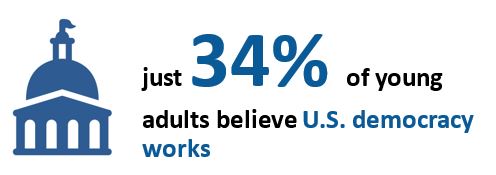A Youth Agenda for American Democracy
Young Americans Convene to Imagine the Future of American Democracy

America’s young leaders are concerned about the future of American constitutional democracy. Only 34 percent of 18-29 year-olds think democracy in the U.S. is working well according to a nationally representative deliberative poll of young adults sponsored by the Center for Deliberative Democracy at Stanford University and the American Academy of Arts & Sciences.
To better understand how members of this cohort perceive the challenges facing the political system they have inherited and how they propose to reinvent American democracy for the 21st century, the American Academy of Arts & Sciences and Washington University in St. Louis convened 50 young leaders from across the U.S. at the virtual Youth Agenda for American Democracy summit organized on November 12, 2021.
Summit participants described a widespread sense of disengagement and disempowerment among their peers stemming from frustration with unresponsive institutions and elected officials and from the hyper-partisanship that dominates the national conversation. They also identified the unequal voice and representation provided by our current system of self-government and the role of social media as exacerbating challenges facing our constitutional democracy.
Despite the seriousness of the challenges expressed by the Summit participants, they agreed on the importance of core democratic values and identified common areas for reform.
Participants at the summit agreed that reforming American constitutional democracy is critical to finding common ground and making progress on many of the great challenges of our time. They articulated their own affirmative agenda for strengthening our constitutional democracy by identifying achievable solutions in the following categories:
-
Better connect people to their government officials and to each other
-
Expand access to voting so that everyone who wants to vote is able to do so
-
Ensure every American has a baseline understanding of civics
-
Reduce the influence of money in politics
-
Bring new people into the democratic process
-
Combat mis/disinformation and information bubbles
-
Promote media literacy
The priorities championed in this affirmative agenda can inform the commitments made by the United States towards building a shared foundation of global democratic renewal at the upcoming Summit for Democracy hosted by the White House in December 2021. Political leaders on both sides of the aisle will benefit tremendously from listening to the concerns that these young Americans have raised about the challenges facing our democracy and their genuine desire for common ground solutions that impact their daily lives.
Additional results from the deliberative poll and next steps from the summit are forthcoming.
